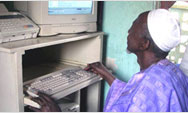Rwanda
Overview
Thirteen years after the genocide that left nearly one million Rwandans dead, the country has achieved major milestones on the road to recovery. Rwanda is a relatively safe country in a turbulent neighborhood but must constantly weigh its need for internal and external security against the imperative to gradually democratize and decentralize to spur economic growth. With a population growth rate of 2.3 percent in 2006 and nearly 350 persons per square kilometer, Rwanda is implementing a newly-passed and long-anticipated land tenure law. Rwanda has provided peacekeeping troops under the auspices of the African Union to the Darfur region of Sudan and is a key ally of the United States for the promotion of peace in the Great Lakes Region. USAID focuses on democracy and governance, health and HIV/AIDS, and rural economic growth in the country.
Programs
Governing Justly And Democratically
USAID/Rwanda effectively supports Rwanda's efforts to enhance democratic local government and decentralization, strengthen civil society organizations, and improve community-based reconciliation efforts. USAID is actively working to create a more open political dialogue to improve citizen participation in local governance. USAID provides technical assistance to central and local governments to effectively plan, budget and deliver decentralized social services, particularly health. USAID also provides legal and regulatory assistance to support the design and drafting of a new land tenure law. This is a pivotal step toward minimizing the potential for land-related conflict.
In November 2006, Rwanda achieved U.S. Millennium Challenge Corporation (MCC) Threshold status. As the implementer of the MCC Threshold program, USAID is working with the Ministry of Finance and Economic Planning on a Threshold plan that will address governance and accountability issues.
Investing In People: Health
The USAID health program aims to reduce maternal and neonatal mortality, improve the quality and sustained use of family planning, and reduce malnutrition among children. Health initiatives work to prevent the transmission of HIV/AIDS, tuberculosis, and malaria. USAID also supports community-managed, pre-paid health insurance schemes called mutuelles. Members of these mutuelles are five times more likely to seek modern health care than nonmembers.
Rwanda is a focus country for the U.S. President's Emergency Plan for AIDS Relief (PEPFAR) and the President's Malaria Initiative (PMI). Rwanda began full implementation of PEPFAR in 2004. PEPFAR-supported facilities are providing treatment to more than 24,000 individuals. PMI began implementation in Rwanda in 2007 and aims to prevent malaria in pregnant women; support the indoor residual spraying of homes in designated districts; increase distribution of long-lasting, insecticide-treated bed nets; and provide life-saving drug therapy.
Economic Growth
The USAID program expands opportunities in rural areas and increases the diversity of off-farm businesses, agricultural productivity, household-level incomes, employment, and corresponding rural financial services for targeted communities. USAID aims to enhance economic opportunities in rural areas by supporting agri-business programs that improve the production of specialty coffee, chili peppers, essential oils, and handicrafts. For example, no specialty coffee was exported from Rwanda prior to 2001. However, export revenue from this sub-sector has grown from zero in 2000 to $8.5 million in FY 2007. Starbucks gave two Rwandan coffee cooperatives supported by USAID its Black Apron award for 2005 and featured Rwandan coffee in 5,000 stores in the spring of 2006.
Based on USAID support, Rwandan craftspeople partnered with Macy's department store to supply baskets during the 2005 holiday season, with total resulting revenue of $150,000. USAID also promotes economic growth and biodiversity conservation around Nyungwe National Park by focusing on the tea, honey, and tourism sectors.
From 2000 to 2007, over 800,000 Rwandans have benefited from food assistance. Food aid activities contribute to employment, improved agricultural technologies, agri-business development, incomes, and food security. For example, USAID works with farmers' cooperatives to promote specialty coffee, soil and water conservation through terracing steep slopes, and land reclamation in the wetlands.
|


